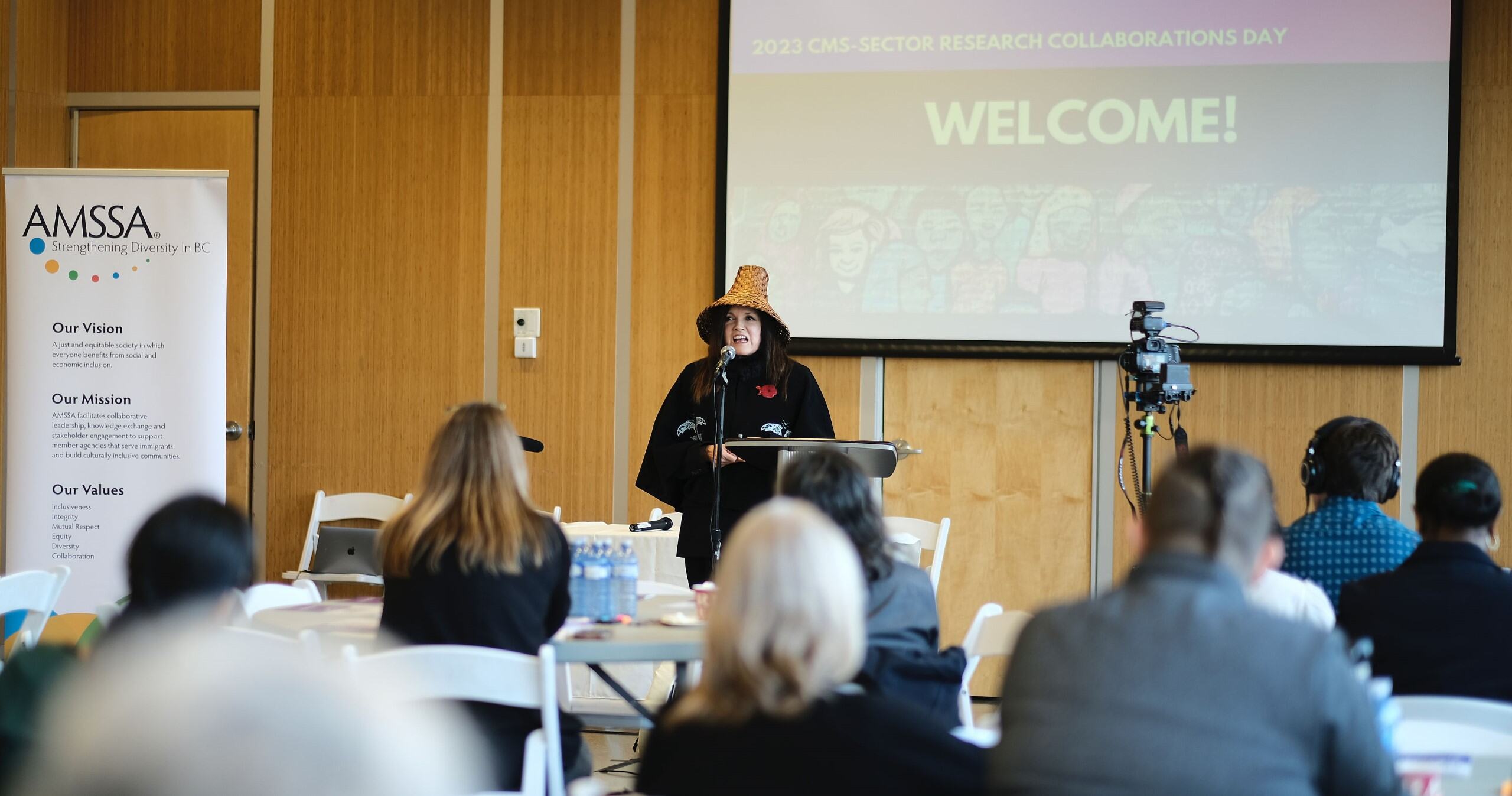
Welcome from Elder Mary Point of the xwməθkwəy̓əm (Musqueam) Nation.
The day had a strong focus on decolonization and how CMS-Sector collaborations can embrace positive and meaningful action around it. There was also an understanding that to be able to engage in decolonizing practices, we need to dive into the realities of current colonialism; hence (de)colonization.
A question posed during the first panel, Seeing Each Other, and widely deliberated throughout the day, struck a chord with participants:
“Will this research re-create colonialism or support the healing?” – Norm Leech
This question, along with the insights shared by keynote speaker Shandin Pete, who explored the application of Indigenous Knowledge within the context of Western Academia, shaped our collective discussion, establishing (de)colonization as a central element in CMS-Sector research collaborations.
What follows is a summary of participants’ comments, ideas, and responses to questions that emerged throughout the day around the topic of decolonization.
To expand on the idea of (de)colonization as a practical endeavour with tangible steps, we’ve started to organize the gathered information into two areas. Drawing inspiration from various Indigenous authors, educators, and knowledge keepers, these areas represent two interconnected processes and provide a framework for positive action.
These processes, or paths, can serve as a guide to define the choices, roles, and actions that non-Indigenous individuals, organizations, and institutions may want to consider as potential avenues for (de)colonization. We present these as a practical tool for the CMS-Sector Collaboration.
We will use the basic terms of decolonization and Indigenization to create a “container” which will serve as a starting point for organizing participants’ contributions and guiding our collective efforts moving forward. The aim is to take mindful and meaningful action as a community of mostly non-Indigenous people at a collective and organizational/institutional level.
The Decolonization Process: Self-examination & Dismantling
Decolonization: Removal or undoing of colonial elements, structures and practices
“The only way to undo racism [colonialism for our purposes] is to consistently identify it and describe it – and then dismantle it” (Ibram X. Kendi)
For non-Indigenous people, when we talk about decolonization, it is important to explore the balance between our efforts in building relationships and our positionality within the colonial reality of Canada:
“But relationships are not enough. Colonialism did not occur because people had bad relationships” (Jody Wilson-Raybould, 2022, p.185)
Here are some comments from participants that speak to this concept:
- We constantly uphold and support colonization
- Positive changes for Indigenous peoples if we still hold most of the power and resources?
- What will research do: Contribute to colonization or help to heal the traumas? – EVERY peer and ethics review should include this
- Similarities between Indigenous and Western research/Knowledge frames
- Having open conversations about Indigenous knowledge that moved beyond cliches
- Decolonization of research and immigration research – Who asks the questions vs Who is being asked
- Complete the discussion about different ways of knowing and thinking
- Ego needs to be examined as one of the key elements that must change
The Indigenizing Process: Honouring Indigenous Knowledge and Governance
Indigenization: Reinstatement of Indigenous ways.
Some points for non-Indigenous people and organizations/institutions to consider regarding ‘Indigenizing”:
- Our participation in it should be explored within decolonizing processes, so we can move beyond tokenistic gestures of recognition or inclusion.
- There can be a fine line between Indigenization and cultural appropriation, and it is important to seek appropriate guidance.
Here are some comments from participants that speak to this concept:
- Connecting to Indigeneity
- Spiritual and Ritualistic elements
- Weaving and Braiding
- Building [research] relationships with Indigenous peoples, communities and Nations.
As we start our collective work, here are foundational questions that could form part of our CMS-Sector collaboration framework:
- Why are we engaging in decolonization & Indigenization and who are we doing this for?
- What role and actions should we take as non-Indigenous institutions, and as a settler collective, in decolonizing? Why?
- What role and actions should we take as non-Indigenous institutions, and as a settler collective, in indigenizing? Why?